

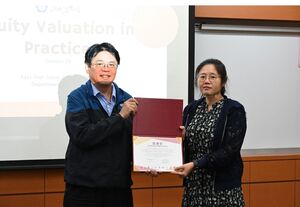
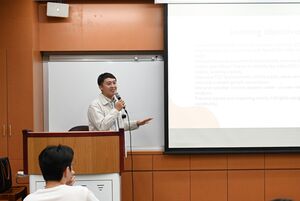
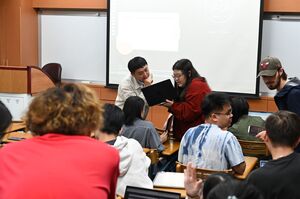
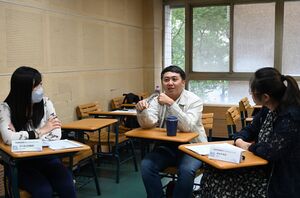
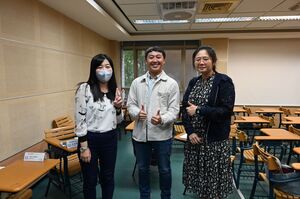
【Article by EMI Resource Center】
On October 29, 2025, the NCCU EMI Resource Center and National Taiwan Normal University (NTNU) jointly organized a cross-university EMI open class. The session was led by Assistant Professor Calvin J. Chiou from the Department of Finance at National Chengchi University (NCCU), featuring the topic Financial Management. Earlier this summer, Assistant Professor Chiou represented NCCU in the 2025 EMI Teacher Training Program hosted by the University of Texas at Austin (UT Austin) and NTNU. This open class showcased how he integrated his training insights into actual EMI classroom practice.
At the event, Professor Jyh-Jian Sheu, Associate Vice President for Academic Affairs, Director of the Center for Teaching and Learning Development, Associate Executive Convenor of the Bilingual Education and Multicultural Promotion Office, and Director of the EMI Resource Center, delivered the opening remarks. He emphasized the significance of inter-university collaboration in promoting EMI teaching practices. The event also featured Professor Yi-Ping Huang from the Department of English as a discussant and Assistant Professor Wen-Chi Shie from the Department of Public Administration as the observing teacher, contributing to post-class pedagogical dialogue and professional exchange.
Before the formal instruction began, Assistant Professor Chiou gave a “lesson briefing” to the observing teachers and participants, outlining the course background, learning objectives, and instructional design. He explained that this undergraduate introductory course aims to help students develop a fundamental understanding of corporate financial management and its practical applications. The course focuses on core concepts such as financial analysis, capital planning, investment decision-making, risk and return, capital budgeting, and market operations. The day’s three key learning objectives were: To understand how to calculate Free Cash Flow (FCF); To apply the Discounted Cash Flow (DCF) model for business valuation; To collaborate in teams to analyze real corporate financial statements, thereby enhancing students’ financial reasoning and English communication skills.
During the class, Assistant Professor Chiou adopted a task-based and collaborative learning approach, integrating authentic corporate data to connect theory with practice. The lesson began with a comparative case study of TSMC and Tesla stock research reports, prompting students to consider: “How do analysts determine whether a company is overvalued or undervalued?” Students discussed this in groups, after which Assistant Professor Chiou linked their ideas to relevant valuation theories. He then explained the day’s learning tasks and process, guiding each team to select a listed company, locate its financial statements, and calculate its FCF following the given formula. Using TSMC as an example, he demonstrated the data sources and calculation steps, and led students in hands-on practice with a Google Sheet template.
Throughout the session, Chiou conducted the class entirely in English, providing key vocabulary and sentence patterns to support student participation in discussions and presentations. After data collection, each group applied a specified discount rate to estimate the firm’s fair value and compare it to its market capitalization. Assistant Professor Chiou moved among groups, observing their discussions, checking calculations, and offering immediate guidance and language feedback. The session concluded with two-minute group presentations summarizing company background, major financial data, valuation methods, and conclusions. He then administered short comprehension checks based on the reports to assess students’ understanding and application of FCF and DCF concepts. Each group also submitted a brief valuation report as their learning outcome.
In the post-observation discussion, the observing teachers and invited experts engaged in in-depth reflection. They commended Assistant Professor Chiou’s tabular method for organizing student outcomes, noting that it effectively tracked progress and encouraged class-wide interaction. Many participants also praised his clear pacing, fluent English delivery, and ability to scaffold professional content at an appropriate language level, as well as his skillful use of digital tools to enhance learning. For improvement, they suggested clarifying teaching assistant (TA) roles to provide real-time support during group work and using shared spreadsheets to monitor group progress instantly. To address differences in student proficiency, they recommended pairing advanced students with peers or incorporating pre-class demonstrations for reinforcement. During the discussion, Assistant Professor Chiou also shared his views on students using AI tools for data analysis. He acknowledged AI’s efficiency but cautioned against overreliance, emphasizing that logical and input errors can occur. He plans to include open-ended assessment items in future evaluations to better gauge analytical and critical thinking skills.
This cross-university EMI open class not only highlighted the depth of instruction in financial management but also demonstrated how Assistant Professor Chiou has integrated insights from overseas training into his teaching practice. Through collaborative exchange, expert observation, and inter-institutional partnership, NCCU EMI Resource Center continues to enhance EMI teaching quality and foster the dual development of subject expertise and English-medium pedagogy among faculty members.